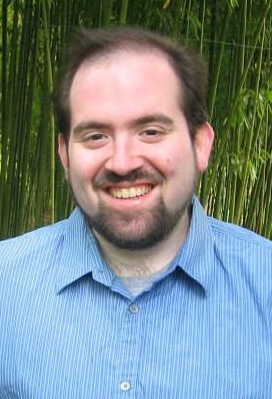by Jarrett Hoffman

Back in 2018, Cleveland Chamber Choir artistic director Scott MacPherson asked Corey K. Rubin to contribute a Hanukkah arrangement to their holiday program. A member of CCC himself, and now also on the composition and music theory faculty of Cleveland State University, Rubin smartly realized that a set of three Hanukkah arrangements would be more appealing in his catalog than a single one all by its lonesome. MacPherson was “more than thrilled” at the idea, Rubin told me at the time.
Those arrangements have been premiered one at a time over the past few years. The final one, Sevivon — and the set as a whole — will be premiered this weekend when CCC presents “Carols Around the World,” a free program of holiday selections and music on the theme of giving thanks. Performances take place Saturday, December 11 at 7:00 pm at Old Stone Church in Cleveland, and Sunday, December 12 at 4:00 pm at Christ Episcopal Church in Hudson.
Now we come to premiere number four in this tale, also to be performed on this weekend’s program.
The plan, as originally pitched to Rubin, was for his final Hanukkah arrangement to also celebrate the return to live concerts, and represent the programmatic thread of thanksgiving.
Rubin replied that he could make that work, but that he already had in mind Sevivon, a song about dreidel — “something that’s definitely lighter in tone,” he said in an interview last week from his office at CSU. “But I said I would be more than happy to write a separate piece that’s secular and fits that theme better.”
A bold move from Rubin, though he expressed it as humbly as possible. “It’s already an honor that they’ve been so committed to performing my Hanukkah music, and other pieces of mine in the past,” he told me. “So when I proposed this, I said that I wasn’t trying to claim more of the spotlight for myself than was appropriate, and that I knew this was probably asking too much.” To his surprise and delight, the answer was a quick and resounding yes.
With Sevivon coming third in the set chronologically — though taking the form of the first movement — there were already parameters in place for it to fit neatly into the arc of the piece.
First, he was looking for a Hebrew text that was traditional in origin so that it could sit side by side convincingly with the other arrangements, Ma’oz Tzur and Mi Yimalel. Not that there was a lot to choose from. “The reality is that there isn’t a deep well of recognizable Hanukkah tunes,” Rubin said. “What I think a lot of American Jews don’t realize is that it’s not meant to be a particularly important holiday in Judaism.”
Musically, he wanted to keep up the theme he had “kind of unintentionally” established in the other two arrangements: transforming the original tunes “in some unexpected way.”
Ma’oz Tzur is often presented in an upbeat mood, but Rubin made it solemn — the mass shooting at the Tree of Life synagogue in Pittsburgh very much on his mind at the time. His arrangement of Mi Yimalel is influenced by other Jewish musical traditions such as Klezmer.
For Sevivon, he decided to play with meter. “When I think about a dreidel spinning, I think of the word hypnotic,” he said. “So instead of having it in this jaunty duple, I put it in 5/8. Singing in that meter is not easy, but we’ve got it now.”
Another key element to the arrangement — in fact the first idea that came to mind for Rubin — is depicting the motion of a dreidel. “It starts to wobble, then the wobbles get a little longer and less predictable, and finally it hangs in the air for just a second — and then thwoop.”
Thus the ending of the arrangement includes a long, sustained chord, “with little hiccups that get a little longer, and longer, and closer together,” Rubin said. “And finally in the last bar, everyone just glissandos down out of singable range.”
While there was a scarcity of songs fitting for the Hanukkah arrangements, there was an abundance of texts on the theme of thanksgiving for Rubin to consider for the other premiere. And yet none of them felt right.
“I was finding all of these poems of thanks that were quite religious, and I really didn’t want it to be religious specifically,” he said. “Not for any personal reason — I just felt like it needed to be more universal to apply to this moment that we’re all in.”
After struggling with that search, Rubin expanded it to include texts that weren’t quite perfectly on topic. That’s when he stumbled upon See More by Jean E. Taddonio (above), who Rubin noted will fly in from California for the Saturday concert.
“It’s not exactly a thanksgiving poem in the traditional sense,” he said. “I think it’s about making the best of a bad situation. And that’s what we’re celebrating — the fact that we have things to celebrate, even though we sometimes lose sight of that. So I ran it by Scott. I wasn’t sure if it was enough on theme, but he was good with it.”
The title See More is about the idea of perspective — looking at the same situation from another angle, or expanding your point of view.
Rubin recited a few stanzas of the poem:
If a dandelion
can push herself
up from the earth
through a sliver of light
in cement
and be called a weed
—or a flower
by those who see more
surely, we too can bloom
“I thought, that’s kind of how I feel about what’s going on in the world.”
No tickets are required for these concerts. A pre-concert talk will be presented by Oberlin Conservatory musicology professor Charles Edward McGuire 45 minutes before the performances. Review CCC’s COVID-19 safety protocols here.
Published on ClevelandClassical.com December 8, 2021.
Click here for a printable copy of this article



